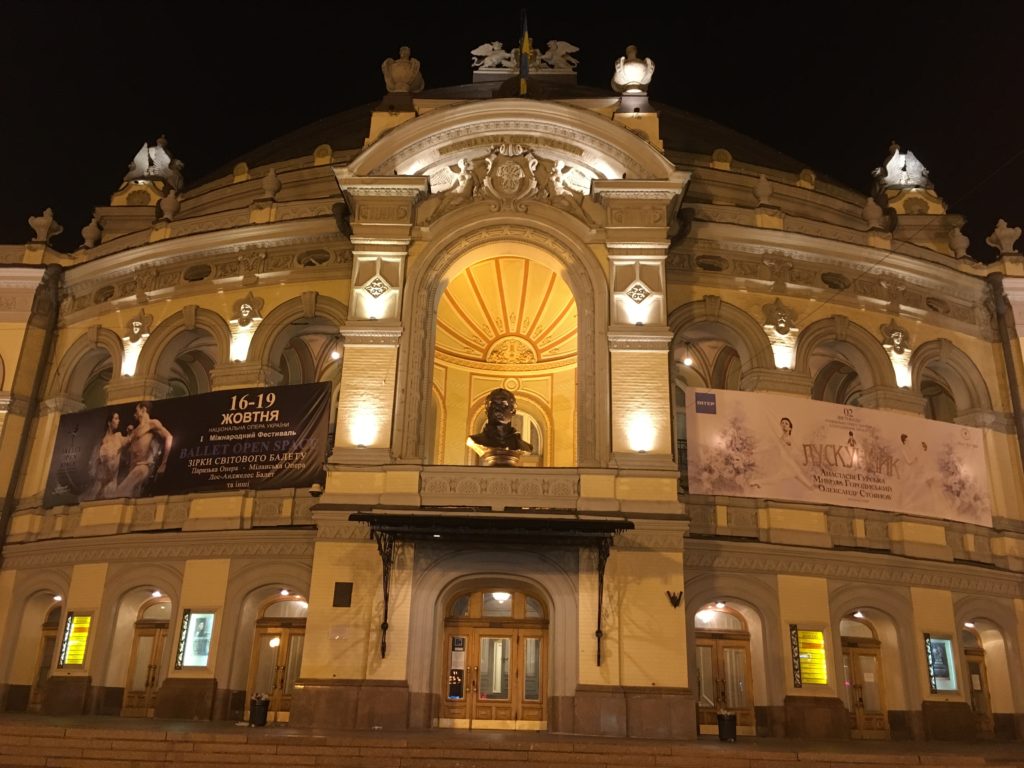
©2019 Derek Henry Flood
Kyiv- Spent a whirlwind less-than-24-hours in the much talked about of late Ukrainian capital the other night. Kyiv. or Kiev is you prefer the Russophone transliteration more common to Westerners, struck me as a magnificent city. Walking around town is like skipping through a vertical tableau of architectural styles ranging from Ukrainian baroque to dated Soviet futurism to the nouveau riche led-lit towers 21st century oligarchs are often fond of.
My reason for being there was primarily economic in nature as the country’s flag carrier was the cheapest way from Athens to New York. But I’d wanted to visit Ukraine (note: not “the Ukraine”) for ages. It is a bridge between Europe and Eurasia, between the mystical Orthodox realm and the earthly rites of Rome, a collision point of the greater Slavic world and the Latinate one.
For the last fifteen or so years Ukraine has become known primarily as point of conflict torn between the orbit of revanchist Muscovites owing fealty to Vladimir Vladimirovitch Putin and those risking to join a greater European supranational project with an aspirationalist mandate loathed by the Kremlin. In 2004-2005 the world witnessed the ‘Orange Revolution’ followed less than a decade later by the 2013-2014 ‘Euromaidan Revolution.’ I simply wanted to stand in this place however briefly and absorb this history that I only witnessed via the internet as the more violent corners of the Levant and South-Central Asia consumed my career path as fascinated as I was by upheaval anywhere in the post-Soviet space.
Just the term maidan (“square” or “gathering place”) alone fascinated me as it was obviously derived from either Arabic (midan) or Turko-Iranian (meydan)-more likely the latter due to the proximity of Tatar culture with its Ottoman vassal Khanate. This idea first occurred to me in Tbilisi in 2002 when I realised the main square there was called Tavisuplebis Moedani and I sort of assumed ‘modedani’ must be related to midan/meydan somehow way back then. It is through language that the history of regions and empires can be interlinked in the mind. If delved into, words connect worlds that we mistake as discrete entities.
As I approached the square, I happened upon a monument to the Heavenly Hundred, a poignant dedication to the more than 100 protesters who were killed by state forces-either Ukrainians or purposefully dispatched Russian agitators-in February 2014 and whose martyrdom helped bring down the Viktor Yanukovych government in power at the time leading to the election of the other Viktor, Yuschenko. As I stood there looking at the image heavy display depicting the tumult just some five years ago, groups of teenagers danced and sang along to Russian-language rap music on the edges of the maidan. Death and life coexisted in the moment. A group of young Bangladeshi male economic migrants kicked a football and laughed in Bangla (Bengali). People milled about in the balmy autumn air on an ordinary night.
I ended up at a node of local nightlife where thrashed skateboards hung from the walls and videos from Barcelona and California played on the tvs. A Ukrainian hip hop anthem blasted away and everyone danced. I sat there only a few blocks from the maidan, grateful to be alive. I mustered as much Russian as I could until a group of youths embraced my curiosity and had me join them. I asked them if Krym (Crimea) would ever rejoin Ukraine. “No I don’t think so” one young skateboarder told me. “We are not strong enough to take it back from Russia. We have to let them (Crimeans) go.” Crimea was part of the ancient Greek world and as I’d just come from Greece I mentioned that. “Many cities in our country were founded by Greeks” one guy piped up. “That is why we have (or had in the case of Crimea) cities that end with [the suffix] -pol. I thought of Sevastopol, Simferopol, and Boryspil. The epochal reach of Greek civilisation never ceases to enthrall me.
“About Donbass?” I asked another referring to the pro-Moscow Donetsk and Luhansk oblasts in the east. “Maybe these regions will gain some special autonomy. People are tired of war. Even Russians are tired.” So there was palpable, cautious optimism, at least among this group.
Ukraine’s current president, Volodymyr Zelenskiy, campaigned on ending the war with pro-Russian separatists with peace talks ongoing. But what Ukraine will look like politically is entirely unknown. Kyiv wants to preserve Ukraine as a unitary state without amending its constitution but if the Donbass types have their way there could possibly be a federative treaty put forth to end the war. No one was talking about the Bidens, Trumps, or referring to their country as a synonym for an invented Beltway scandal. Ukraine has been at war for over five years for god’s sake.